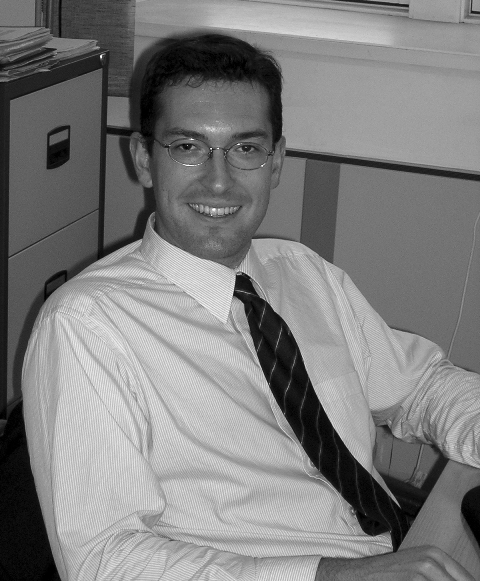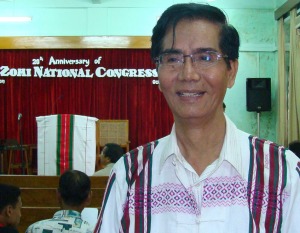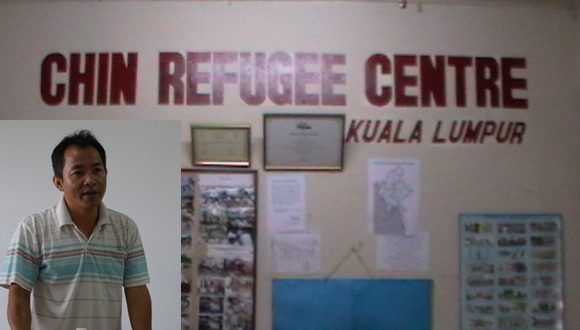Exclusive Interview With Benedict Rogers, Author of Than Shwe’s Biography

[CG Note: Benedict Rogers, East Asia Team Leader of Christian Solidarity Worldwide UK, has been actively involved in Burma issues for more than 10 years. He has travelled extensively on human rights fact-finding missions to Burma on the Thai-China-and-India-Burma borders and has also contributed enormously towards helping the ‘voiceless’ peoples of Burma by speaking and writing for and on their behalf.
His much-awaited book Than Shwe: Unmasking Burma’s Tyrant is due to be published next month, May 2010, with a foreword by Vaclav Havel, former President of Czech Republic. In this exclusive interview by Chinland Guardian, Van Biak Thang talked to Benedict Rogers more about Burma’s secretive junta chief Than Shwe.
The book will be available in bookstores in South-East Asia, especially Thailand, from May and can be ordered from Silkworm Books (http://www.silkwormbooks.com.).From July, it will be available in Europe, the US and other markets and on Amazon (http://www.amazon.com). Benedict Rogers is also the author of A Land Without Evil: Stopping the Genocide of Burma’s Karen People and of a report Carrying the Cross: The military regime’s campaign of restriction, discrimination and persecution against Christians in Burma.]
Chinland Guardian: How did you come up with this idea of making a choice on writing about a very reclusive tyrant Than Shwe?
Ben Rogers: The idea came from a discussion with my good friend Jeremy Woodrum, co-founder of the US Campaign for Burma. Jeremy pointed out to me that there is no biography of Than Shwe available, and that biographies of dictators are a good way of providing a new angle on a situation. He said there are biographies of Kim Jong-il, Robert Mugabe, Saddam Hussain and others but nothing has been written about Than Shwe. I thought that it would be a way of raising awareness about the situation in Burma, by telling the story of Burma’s ruler, his rise to power, and what is happening under his rule. The book includes some historical context, particularly about the events in Burma in the 1930s and 1940s during the period in which Than Shwe was growing up, as well as quite a lot of background to the Tatmadaw, military training, Ne Win’s coup and the BSPP period. It looks at Than Shwe’s rise through the military, including his time at the Central Party School and working in psychological warfare, his promotion to South-West Regional Commander and then his rise to the very top. It also includes extensive sections on the nuclear programme, biological and chemical weapons, drugs, Naypyidaw, the influence of Than Shwe’s business cronies and Than Shwe’s personality.
Chinland Guardian: It must have been quite a challenge in terms of making research and getting information about him. How did you actually begin and organise your research?
Ben Rogers: It certainly wasn’t easy. I wrote to Than Shwe, and also to the Burmese ambassador in London, and requested an interview, but unsurprisingly I got no reply. Instead, my primary sources were several defectors from the Tatmadaw who have known Than Shwe at various stages of his life, including some who knew him early in his career, during military training, someone who worked for him when he was South-West Regional Commander, and others who have known him since he became the Senior General. I also interviewed foreign diplomats who have met him, including former British, Australian, Japanese and Thai ambassadors, several former American diplomats and former UN special envoy Razali Ismail, as well as former UN special rapporteurs Yozo Yokota and Paulo Sergio Pinheiro.
Chinland Guardian: During the course of your research and writing, did you happen to meet with him or any of his family members or relatives?
Ben Rogers: I was able to talk to a distant relative, but otherwise I had to rely on defectors.
Chinland Guardian: In brief, tell us how Than Shwe rose to power, how he can hold on until today and what he thinks now and for the future.
Ben Rogers: The secret of his success is his very lack of charisma, flair, overt ambition or obvious talent. Until he became the number one, Than Shwe kept his ambitions quiet, showed no outstanding abilities, and displayed total, complete loyalty to his commanders and to the Tatmadaw. Ne Win valued loyalty above all else, and Than Shwe happened to be in the right place at the right time when others were plotting against Ne Win. Some say Ne Win actually disliked able soldiers, because he perceived them as a threat, and rewarded loyalty over ability. Than Shwe was so colourless, so unimpressive, and so obedient, that he was not perceived as a threat by his superiors and as a result he was rewarded with promotion. He holds onto power today because he has control over promotions – many soldiers owe their careers to him and feel indebted. In addition, he has been a skilled and ruthless manipulator, using divide-and-rule tactics to strengthen his power base and weaken his potential rivals, within and outside the Tatmadaw.
Chinland Guardian: Although he has been infamously known as a ruthless, brutal and mysterious dictator, did you at some point during your writing find anything that is positive about him?
Ben Rogers: Some people who were close to him when he was South-West Regional Commander say that at that time, he was quite a modest, simple man who was not particularly corrupt, did not live an extravagant lifestyle, and was kind to those around him. One person said that at that time he was actually quite a “nice guy” – although of course if you look at what happened in the South-West Region when he was commander, even then he displayed cruelty and brutality in crushing dissent.
Chinland Guardian: One of the book reviews by Soe Myint, Editor of Mizzima News said: Burma’s dictator Than Shwe is a reclusive person, surrounded by rumour, some of which is true and some not. The ‘not true’ bits could be quite interesting to know if you came across any.
Ben Rogers: There are a lot of stories in the book which were impossible to verify – and I say that quite clearly. The nature of Burma, the military and the secrecy surrounding Than Shwe gives rise to a lot of rumours and it is uncertain what is true and what isn’t. Some rumours are quite colourful, amusing and extraordinary – but read the book to find out!
Chinland Guardian: Zoya Phan and John Dayal also remarked in their reviews of the atrocities and attacks inflicted upon the peoples of Burma by Than Shwe and his military regime. What actually are the driving forces behind all these?
Ben Rogers: A combination of factors. Firstly, he is intolerant of dissent and determined to hold onto power at all costs. That drives his cruelty. Secondly, he is very much an extreme Burman nationalist, who is intolerant of non-Burman ethnic groups and also uses a distorted, perverted form of Buddhism for political purposes which makes him intolerant of non-Buddhist religious minorities. So it’s a combination of power, nationalism, a deep belief in the Tatmadaw, and racism.
Chinland Guardian: Mainly after the Saffron Revolution in 2007 where Than Shwe-led military authorities attacked, arrested and killed many protestors including Buddhist monks, there have been negatively growing speculations over their religious stands. Is Than Shwe actually a Buddhist devout?
Ben Rogers: He certainly misuses Buddhism – or rather a distorted, perverted form of Buddhism – for political purposes, and very ostentatiously parades himself as a devout Buddhist. It’s clearly an influence in his identity. However, when you look at the teachings of Buddhism and you look at Than Shwe’s actions and what is happening in Burma under his rule, it is very hard to believe that he is really following Buddhism. If he was a true Buddhist, Burma would be very different.
Chinland Guardian: Religious persecutions have widespread all over the country, particularly in ethnic areas. Christians, Muslims and other religious groups have been suffering from various forms of repressive measures under the military dictatorship. Is it true that Than Shwe is most responsible and is there any particular reason why he does all these?
Ben Rogers: He is certainly responsible, because these things are happening under his rule and he has not taken any action to prevent them. As I mentioned earlier, he is intolerant of ethnic and religious minorities, for racial and nationalistic reasons as well as political reasons. His belief is in extreme Burman nationalism, and a belief that to be Burmese you must be Buddhist, which means that he is intolerant of anything different, especially different religions and ethnicities. In addition, religion is very much tied up with ethnicity in terms of the identity of many groups. For the Chin, Christianity is interwoven with their identity. For the Rohingyas, Islam is central to their identity. Than Shwe attacks their religion as a way of attacking their identity.
Chinland Guardian: Than Shwe is said to be determined to hold the SPDC’s upcoming 2010 general election. Is this book any related to it at all?
Ben Rogers: Certainly I cover this in the book quite extensively. The National Convention, the constitution drafting process and the referendum, as well as the future succession, are all major themes in the book.
Chinland Guardian: How long does it take you to write this biographical book and which part did you find most time-consuming?
Ben Rogers: It took me one year to research and write the book. I was not working on it full-time, as I have my other work with CSW, but I spent a lot of time on it during that one year. I travelled extensively for the research, to Burma, Thailand, India, China, Singapore, Malaysia, Japan, the United States and in the United Kingdom. Of course much of this travel was for CSW and I was able to combine my CSW work and my research for the book. The part that was most time-consuming was probably the amount of background reading I had to do – for many months I only read books about Burma, I didn’t read any other books. The interviews also took up a lot of time.
Chinland Guardian: Are you working on any other books on Burma?
Ben Rogers: Yes, I am now writing another book, about Burma’s struggle for freedom. It will try to combine the story of the democracy movement, the NLD, Aung San Suu Kyi, political prisoners with the story of the ethnic groups, drawing on my travels to the Karen, Karenni, Shan, Mon, Kachin, Chin, Rakhine and Rohingya, to try to give as comprehensive a picture of Burma as possible. It will include a whole chapter on the Chin, for example, which is a part of Burma that receives very little attention internationally. It will be called Burma: A Captive Nation, and will be published in 2011.





